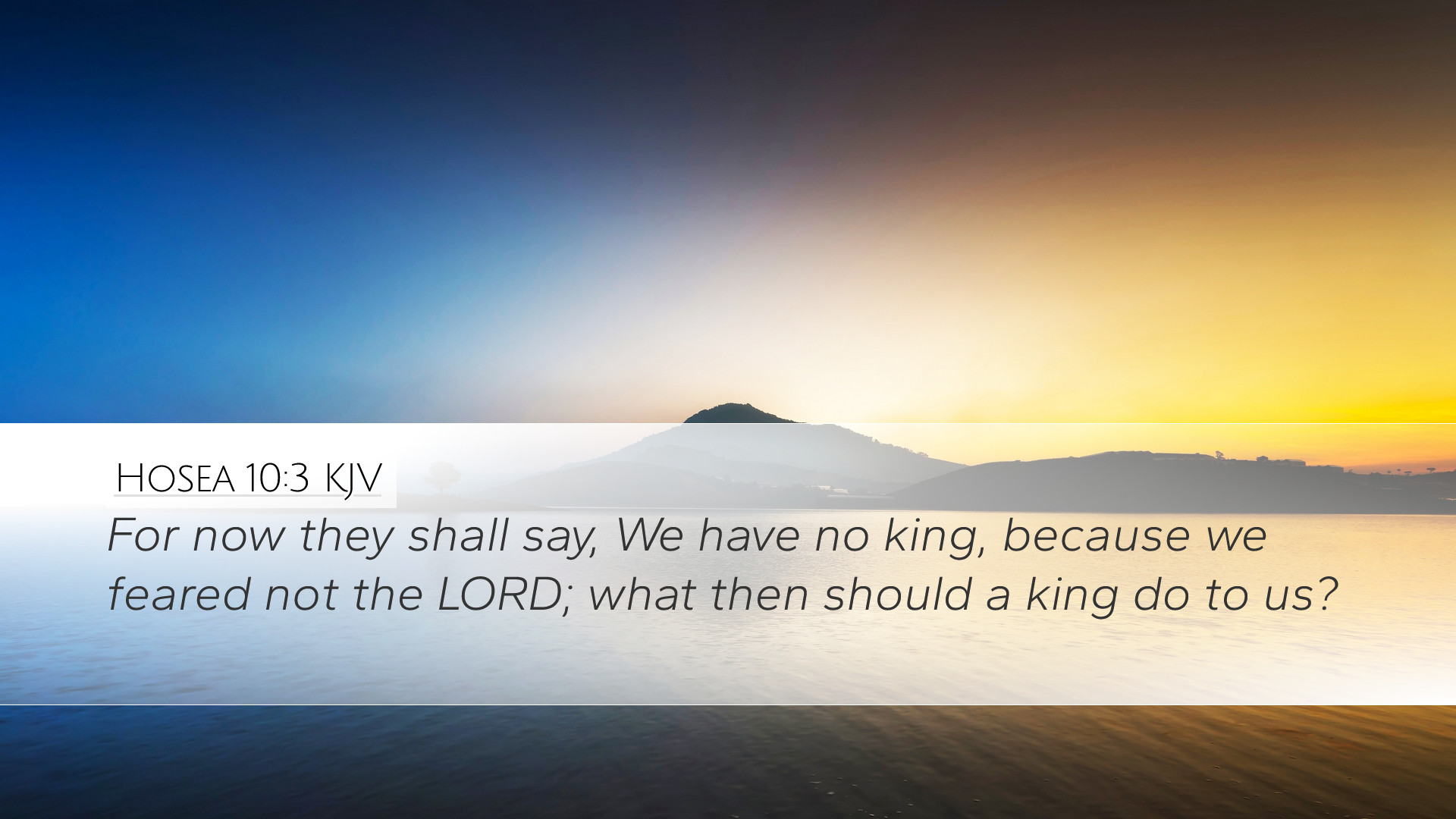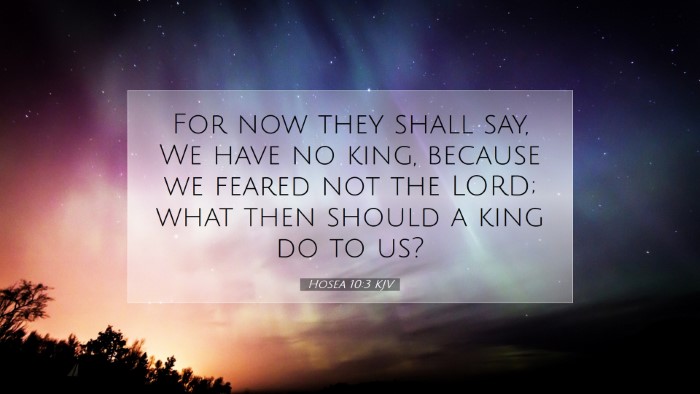Old Testament
Genesis Exodus Leviticus Numbers Deuteronomy Joshua Judges Ruth 1 Samuel 2 Samuel 1 Kings 2 Kings 1 Chronicles 2 Chronicles Ezra Nehemiah Esther Job Psalms Proverbs Ecclesiastes Song of Solomon Isaiah Jeremiah Lamentations Ezekiel Daniel Hosea Joel Amos Obadiah Jonah Micah Nahum Habakkuk Zephaniah Haggai Zechariah MalachiHosea 10:3
Hosea 10:3 KJV
For now they shall say, We have no king, because we feared not the LORD; what then should a king do to us?
Hosea 10:3 Bible Commentary
Commentary on Hosea 10:3
Hosea 10:3 states, "For now they will say: 'We have no king, because we did not fear the Lord. And as for a king, what could he do for us?'" This verse encapsulates the spiritual and political plight of Israel during Hosea's prophetic ministry.
Contextual Overview
This verse emerges in a context where Israel had turned away from God and indulged in idolatry, prompting divine judgment. Hosea, functioning as both prophet and social critic, highlights the futility of their reliance on earthly kings who cannot deliver them from the consequences of their sins.
Historical Background
In Israel's history, the period of the judges was marked by a cycle of rebellion against God, followed by oppression, and eventual deliverance. The monarchy introduced by Saul, and continued through David and Solomon, experienced both triumphs and tragedies. After Solomon's reign, the kingdom divided, and Israel (the northern kingdom) experienced a succession of kings who led the people astray.
Theological Implications
This verse reveals key theological insights pertinent to scholars and clergy alike:
- The Sovereignty of God: The verse illustrates God's ultimate authority over human governance. Israel's need for divine kingship is starkly contrasted by their rejection of God's rule.
- The Consequences of Idolatry: The people's abandonment of true worship led to a spiritual vacuum, resulting in political instability and resulting in questioning the efficacy of earthly rulers.
- The Importance of Covenant Faithfulness: Their failure to fear the Lord reflects a breach in relationship with God, evidencing the need for covenant loyalty.
Commentatorial Insights
Matthew Henry's Commentary
Matthew Henry emphasizes the mood of despair reflected in the verse. He notes that Israel, in their backsliding, had essentially nullified the need for kingship by rejecting the authority of God. He points out that a lack of reverence for the true King leads ultimately to chaos among nations. In his view, when the earth's rulers are challenged by a nation’s sinfulness, their capacity to govern is severely compromised.
Albert Barnes' Commentary
Albert Barnes offers an analytical approach, indicating that the phrase "we have no king" is indicative of the people's internal conflict. They acknowledge their estrangement from God and, thus, from governance that would protect and lead them. Barnes suggests that their claim, “what could a king do for us?” unveils profound skepticism about human leadership when disconnected from divine guidance. His interpretation suggests that without acknowledging God as king, all earthly leadership becomes trivial and ineffectual.
Adam Clarke's Commentary
Adam Clarke expands on the implications of Israel's condition. He remarks that in their state of sin, they had cast aside any semblance of monarchy, reflecting a broader dissatisfaction with leadership. Clarke observes that this rejection highlights the deep spiritual malaise within the nation, encapsulated by a lamentable irony: they sought to reject both God’s authority as king and to question the need for human kingship. This rejection left them vulnerable to their enemies and stripped of guidance.
Application and Reflection
For pastors and theologians, this verse serves as a platform for discussion on several key points:
- Leadership: The importance of godly leadership in churches and communities is underscored, reminding us that civil governance ought to be reflective of divine principles.
- Spiritual Condition: The state of the hearts of God's people is paramount. This verse calls for introspection into communal and individual faithfulness and the need for a return to the Lord.
- Hope in Restoration: Scholars may discuss the overarching narrative of Hosea where despite judgment, there is an intrinsic hope for restoration, emphasizing God's faithfulness amidst human unfaithfulness.
Conclusion
The message in Hosea 10:3 serves as a cautionary tale against the dangers of national and personal idolatry, producing a void where true leadership and guidance should exist. This commentary from public domain sources enriches our understanding of the text, reminding us of the spiritual dynamics at play in both ancient Israel and contemporary society. Thus, there remains an inherent call to recognize and submit to the authority of God in all aspects of life.


